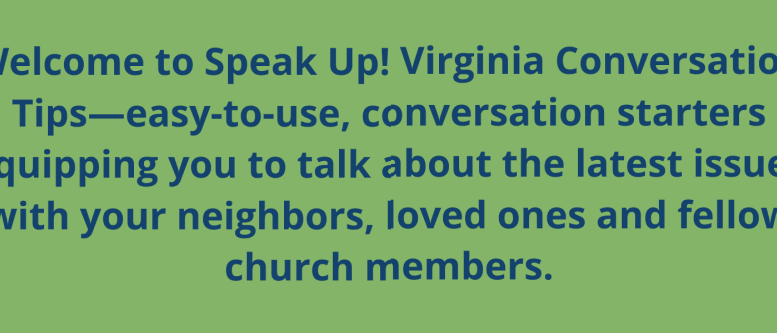Speak Up Virginia!

Gov. Northam called Virginia’s state legislators into a special session this week to address areas that need “critical support” during a time of social unrest and the COVID-19 crisis. When the average person hears the word “critical,” legalization of marijuana is probably not top of mind.
Even so, that’s exactly what several left-wing leaders are pushing as top priority. In an Aug. 11 letter, for instance, Richmond Mayor Levar Stoney urged General Assembly leaders to “take immediate action” to “legalize marijuana” and establish a “tax system for recreational use.” Unfortunately, many people are genuinely confused by claims that regulating “recreational” marijuana will help, not harm, families.
Below is a sample Q&A to help you respond redemptively:

Question: Leaders like Mayor Stoney and Attorney General Mark Herring pointed out that a disproportionate number of minority communities are impacted by marijuana arrests. In light of that, why wouldn’t legalizing marijuana be a compassionate, social justice measure?
Answer: The devastation that drug addiction already wreaks on families—and especially minority families—is well documented. The epidemic of fatherlessness affecting Black Americans, for instance, often goes hand-in-hand with the plague of drug addiction. So there’s nothing compassionate about creating policy that sets up more pitfalls for those trying to escape this vicious cycle. Plus, there’s no convincing evidence that legalizing marijuana is actually going to reduce arrests or help minority communities. Consider:
- Marijuana-related arrests significantly increased among Black and Hispanic youth in Colorado after the state became one of the first to legalize marijuana. A similar trend was documented in other states. (Even though marijuana was legalized, arrests can still happen for those who are underage, driving impaired or bringing drugs on school property, etc.)
- A recent study of nearly 25,000 youth and young adults shows that having parents who use marijuana is associated with increased risk of substance use, including opioids. Considering that opioid overdoses have become the leading cause of unnatural death in Virginia, it’s fair to ask whether legalizing a drug that opens the door for more risk is really a wise, compassionate step.
- Plus, today’s marijuana is more dangerous and addictive than ever before. “It’s significantly more potent and it can be further concentrated for use. A combination that can harm the developing brain,” warned U.S. Surgeon General Jerome M. Adams, M.D.
Question: I’ve heard it said that this issue is no different than gambling, alcohol or tobacco—we can’t prohibit it out of existence, so why not regulate it so it’s more safe?
Answer: First, let’s address the question of “safety.” As previously mentioned, in states like Colorado, there’s little evidence that legalizing marijuana actually results in a decrease of arrests for Black and Hispanic youth. Plus:
- After Colorado legalized marijuana in 2012, traffic fatalities in the state involving drivers intoxicated from marijuana rose by 86 percent between 2013 and 2017, with over one-fifth of all traffic fatalities involving a driver testing positive for marijuana by 2017, according to records from national and state transportation agencies.
- The same pattern is evident in Washington State: After the state legalized recreational sales of marijuana, daytime drivers testing positive for THC (the hallucinogenic ingredient in marijuana) nearly tripled from 8 percent to 23 percent within six months.
- The impact on children and teens is especially disturbing:
- Poison control calls for kids who’ve ingested marijuana have skyrocked in states (like Maine and Colorado) where the drug has been legalized. “Some of these edibles kids can get a dose of 100 or 200,” a doctor told reporters. “They’re much smaller than an adult and they’re not used to it so they have no tolerance built up.”
- Schools in states that loosened marijuana laws have had to issue warnings after being forced to call paramedics because kids brought marijuana gummies or pot-laced brownies and shared them with friends. (See examples from Colorado, Massachusetts, Michigan, New Mexico and Utah.)
- Given that this whole special session was called to address urgent needs during a pandemic—it’s especially ironic that even CNN acknowledged that smoking marijuana, “even occasionally,” increases your risk for severe complications from COVID-19.
But there is in fact one way this pattern is comparable to “Big Tobacco” and gambling industries: It repeats the same old cycle of allowing government officials, well-paid lobbyists and greedy industries to profit off the addictions of vulnerable kids and families. You may recall how the tobacco industry came under so much fire for marketing nicotine products with youth-friendly packaging. Seems not much has changed on the road from Joe Camel to Cannabis gummy bear.
Question: I’ve heard arguments that this will really help our state budget. For instance, in an email, Virginia Senator Adam Ebbin said the sale of regulated marijuana can “net millions in state revenue.” What do you think?
Answer: This is a frequently repeated claim. But the research just doesn’t bear it out. In fact, the opposite case can be made that, in the long run, the state will end up spending far more to alleviate the problems caused by legalizing marijuana than it will ever gain. For instance, a report from the Centennial Institute found that: “For every dollar gained in tax revenue, Coloradans spend approximately $4.50 to mitigate the effects of legalization. Costs related to the healthcare system and from high school drop-outs are the largest cost contributors, but many other costs were included as well. Costs of marijuana ranged from accidental poisonings and traffic fatalities to increased court costs for impaired drivers, juvenile use, and employer related costs.”

It’s clear you can’t sweep away all of the detrimental impacts of legalized marijuana by simply saying we’re going to re-coup costs through taxation. That’s a parasitical strategy based on those in power profiting off the struggles and addictions of the weak. It is not a compassionate response and it’s not the way to strengthen and uplift the families who are struggling most in our state.
As we closely monitor whether the General Assembly follows through with Mayor Stoney’s and others’ demands, stay tuned and keep these conversation points close at hand in case you need to speak up! Even if state legislators do not address this issue in the next few weeks, it will most likely be proposed January, so it’s a good idea to educate yourself while you have the time.
To dig deeper:
Blog: Recreational Marijuana in VA is a Very Bad Idea
Report: The Cost of Marijuana Legalization to Society
Website: Truth on Weed: Truth Checking the Marijuana Lobby





